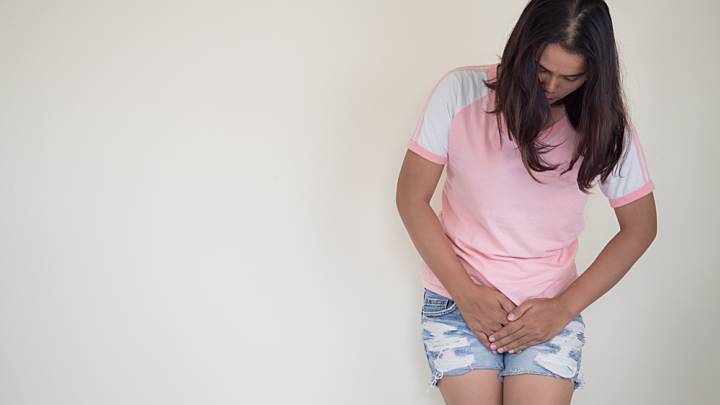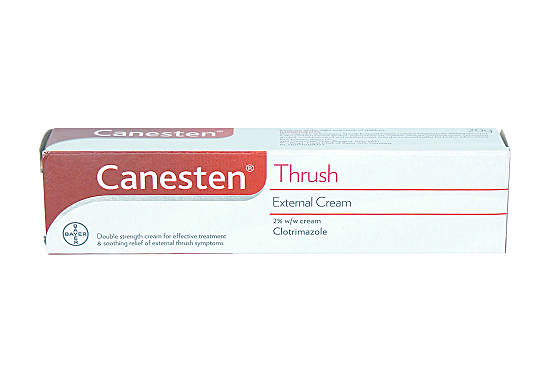Thrush Symptoms

Medically reviewed by
Dr Kathryn BasfordLast reviewed: 11 Apr 2019
Vaginal thrush symptoms, causes, and prevention

Vaginal thrush is a common yeast infection that can affect the female genital area. It’s caused by a type of fungi called Candida.
Candida usually lives around the vagina without causing problems, but when it multiplies too much, it can cause unpleasant and uncomfortable symptoms, leading to vaginal thrush.
Vaginal thrush can be treated with antifungal medications which you can buy online or from your local pharmacy.
What are the symptoms of vaginal thrush?
The symptoms of vaginal thrush can range from mild to severe and they include:
- itching and irritation in the vagina and vulva
- a burning sensation, especially during intercourse or while urinating
- thick, white, odor-free vaginal discharge (can also be watery discharge)
- redness and swelling of the vulva, vaginal pain, and sores and rashes on the skin around the vagina can also happen, but these are usually more severe symptoms
What are symptoms of other kinds of thrush?
Apart from vaginal thrush, people can also get oral thrush and men can get a thrush infection around their genital area.
Some symptoms of male genital thrush include:
- irritation, burning and redness around the head of the penis and under the foreskin
- a white discharge (like cottage cheese)
- an unpleasant smell
- difficulty pulling back the foreskin
- pain and irritation when you have sex
- pain when you urinate
Symptoms of oral thrush include:
- creamy white sores on your tongue, inner cheeks, and sometimes on the roof of your mouth, gums, and tonsils
- slightly raised bumps with a cottage cheese-like appearance
- redness, burning, or soreness, might be severe enough to make it hard to eat or swallow
- slight bleeding if the sores are rubbed or scraped
- cracking and redness at the corners of your mouth
- a cottony feeling in your mouth
- loss of taste
- redness, irritation, and pain under dentures (denture stomatitis)
from £15.99
from £15.99
from £17.99

No results found.
Please check your spelling or try another treatment name.
What else can cause symptoms similar to thrush?
There are other infections that can cause similar symptoms to vaginal thrush in women. They can easily be confused with thrush because they may also show symptoms of vaginal discharge, pain, soreness, and itching.
Other possible causes of symptoms related to thrush include:
- genital herpes
- bacterial vaginosis
- eczema
- sexually transmitted infections (STIs)
- urinary tract infection
Should I get my thrush symptoms tested?
Most women who have had a thrush infection before can recognise the symptoms and get antifungal treatment. But, because the symptoms of vaginal thrush can be confused with other causes, it’s a good idea to visit your GP if:
- you have thrush for the first time
- you're under the age of 16 or over 60
- you're pregnant or breastfeeding
- you have unusual symptoms, like coloured or smelly discharge or sores on the vulva (skin around your vagina)
- you have abnormal vaginal bleeding or pain in your lower tummy
- you've had two episodes of thrush within the last six months
- you've reacted badly to antifungal treatment in the past, or it didn't work
- you or your partner have previously had a sexually transmitted infection (STI) and you think it might have come back
- your symptoms don't improve after 7-14 days of treatment
To test for a vaginal thrush infection, your GP will usually examine your vagina and vulva, then take a swab sample and send it to the lab to confirm the Candida infection, as well as testing for other infections, like STIs.
There are also home test kits for thrush and bacterial vaginosis, but these are not reliable, and they don’t rule out STIs and other infections.
What should I do about my thrush symptoms?
You can take antifungal thrush treatment to get rid of vaginal thrush symptoms. You can get treatment online, or from pharmacies, if you've had thrush diagnosed in the past and you are confident you can recognise the symptoms.
Thrush medications can be an oral tablet you take by mouth, a tablet you insert into your vagina (pessary), or internal or external creams to relieve the irritation. Usually, thrush symptoms should clear up after a course of medication or from using the cream every day.
To avoid thrush if you get it regularly, you can:
- use water and an emollient (moisturiser) soap substitute to clean the vulva (skin around your vagina), but avoid cleaning this area more than once a day
- apply a greasier moisturiser to the skin around your vagina several times a day to protect it: be aware that these moisturisers can weaken condoms
- avoid potential irritants, like in perfumed soaps, shower gels, vaginal deodorants, wipes, and douches
- avoid wearing tight-fitting underwear or tights. Some women find that special silk underwear designed for people with eczema and thrush is helpful
- if you have diabetes, make sure your blood sugar level is kept under control

Dr Kathryn Basford is a qualified GP who works as a GP in London, as well as with ZAVA. She graduated from the University of Manchester and completed her GP training through Whipps Cross Hospital in London.
Meet our doctorsLast reviewed: 11 Apr 2019
-
Mayo Clinic. (2019). Oral thrush.. [online] Available at: https://www.mayoclinic.org/diseases-conditions/oral-thrush/symptoms-causes/syc-20353533 [accessed 22nd March 2019].
-
National Health Service (2019). Thrush in men and women. [online] Available at: https://www.nhs.uk/conditions/thrush-in-men-and-women/# [accessed 22nd March 2019].
-
NHS Inform (2019). Vaginal thrush. NHS.
-
Patient.info. (2019). Vaginal thrush. [online] Available at: https://patient.info/sexual-health/vaginal-discharge-female-discharge/vaginal-thrush-yeast-infection#nav-6 [accessed 22nd March 2019].











